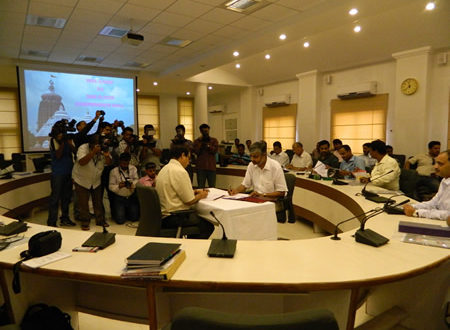MoU signed with Odisha Government to help mitigate train hits
Odisha, May 10 2013: To devise a strategy to save the national heritage animal from train hits in the state, the Department of Forests and Environment, Government of Odisha, signed a Memorandum of Understanding with Wildlife Trust of India (WTI), today.
The state of Odisha has a thriving wildlife population with many major species such as sloth bears and elephants present in significant numbers. Elephant habitat in the state spreads over 11000 sq km covering about 24% of the state’s forest cover, but most of these areas have railway tracks crossing through them. As other Indian elephant bearing states, Odisha has seen a spurt in elephant death due to train hits over the past decade.
The MoU underlines identifying critical accident-prone areas along the railway track network, understanding cause for these accidents, and developing site-specific mitigation measures.

The MoU underlines identifying critical accident-prone areas along the railway track network, understanding cause for these accidents, and developing site-specific mitigation measures.
Photo: Rudra Mahapatra/WTI
“As WTI has successfully devised strategies to counter this threat in a number of areas – most prominently Rajaji National Park, we thought to bring them in to tackle this in our state. WTI will prepare a detailed report on mitigation plan and implement the project over a period of 12 months,” said Forest and Environment minister Bijayshree Routray after signing the MoU. “The railways have been requested to instruct drivers to reduce speed of trains in the pre-identified areas as well as developing better signage system and sensitise railway staff,” he added. Vivek Menon, Executive Director, WTI said, “It will take time to stop these deaths altogether in such a large state with such a vast railway network. Still, intensive interventions have bore results, and we are positive that the strategy devised by our field team, and collaborative implementation of these strategies by Railway and Forest authorities will help reduce these accidents.”In the past, WTI has assisted the Odisha FD in a number of other activities including identifying and marking elephant corridors. WTI has also assisted in sloth bear conservation in the state – helping protect bear dens, preventing poaching of bear cubs, running campaigns to save the bears, encouraging and facilitating involvement of locals in conservation, trained and equipped frontline staff for better protection of wildlife. The NGO has also provided support for Rapid Action Projects to protect nesting sites of Olive Ridley turtles, among others.“With wildlife populations dwindling all over the country, with many species on the brink of extinction such collaborations between the state governments, forest departments and NGOs are the key in helping the save the remaining animal. We are happy to assist the state of Odisha in whatever capacity we can,” said Dr Sandeep Tiwari, the Head of the Wild Lands Division in WTI









